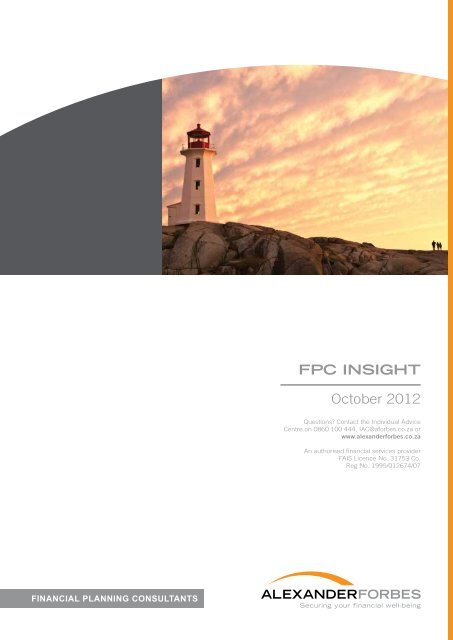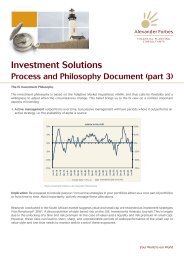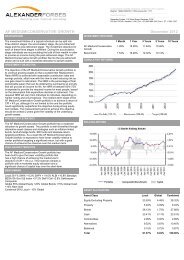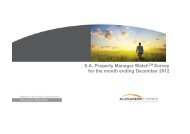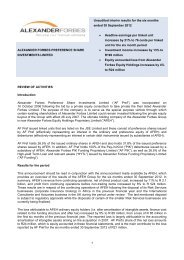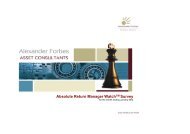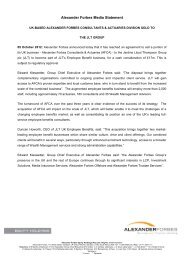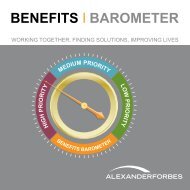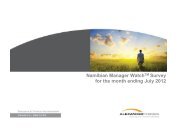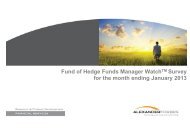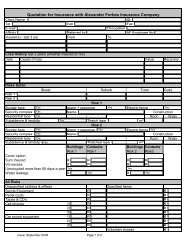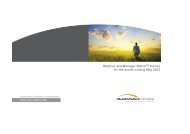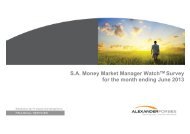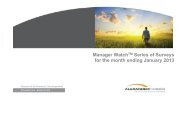FPC INSIGHT October 2012 - Alexander Forbes
FPC INSIGHT October 2012 - Alexander Forbes
FPC INSIGHT October 2012 - Alexander Forbes
Create successful ePaper yourself
Turn your PDF publications into a flip-book with our unique Google optimized e-Paper software.
<strong>FPC</strong> <strong>INSIGHT</strong><br />
<strong>October</strong> <strong>2012</strong><br />
Questions Contact the Individual Advice<br />
Centre on 0860 100 444, IAC@aforbes.co.za or<br />
www.alexanderforbes.co.za<br />
An authorised financial services provider<br />
FAIS Licence No. 31753 Co.<br />
Reg No. 1995/012674/07<br />
FINANCIAL PLANNING CONSULTANTS
<strong>INSIGHT</strong> | OCTOBER <strong>2012</strong><br />
Introduction<br />
Linda Sherlock l Head of Advisory, Retail, <strong>Alexander</strong> <strong>Forbes</strong><br />
Welcome to the <strong>October</strong> edition of<br />
<strong>FPC</strong> Insight.<br />
We’re now at that stage of the year where<br />
everything is urgent and energy is low,<br />
so we thought we’d help you with a little<br />
motivation.<br />
Bonga Mokoena from <strong>Alexander</strong> <strong>Forbes</strong>’s<br />
Public Sector Division shares his views on<br />
motivation, <strong>Alexander</strong> <strong>Forbes</strong> consultant<br />
Gavin Mofsowitz explains what motivates<br />
an offshore investment decision and Carl<br />
van der Berg gives us ways to budget that<br />
will keep us on track.<br />
We also share interesting stats about why<br />
saving for retirement is a must, and we<br />
have an article with ways to keep your<br />
world greener.<br />
If you still need more for the final push<br />
before the end of the year, you still have<br />
two more editions of <strong>FPC</strong> Insight to look<br />
forward to, and we promise to keep<br />
bringing you informative, relevant and<br />
insightful articles to help you on your<br />
financial journey with us.<br />
Until next time!<br />
Linda<br />
An authorised financial services provider FAIS Licence No. 31753 Co. Reg No. 1995/012674/07
<strong>INSIGHT</strong> | OCTOBER <strong>2012</strong><br />
PROFILE WITH A VIEW<br />
Bonga Mokoena | Managing Director, Public Sector Division, <strong>Alexander</strong> <strong>Forbes</strong><br />
Staying motivated<br />
during tough economic<br />
times<br />
What motivates me about our business<br />
is that it’s about people. What we do<br />
impacts on real people and on their<br />
financial well-being. That’s extremely<br />
important to me. I apply my skills to<br />
the best of my abilities so as to make a<br />
positive difference in people’s lives. It’s<br />
important to have a higher purpose to<br />
motivate us in everything we do. It helps<br />
to stay focussed on the bigger picture<br />
and maintain a positive attitude and view<br />
of things.<br />
How tough are our<br />
contemporary<br />
economic times<br />
While we are experiencing some of<br />
the effects of what is happening in the<br />
Eurozone and other major economies,<br />
our resilience has been strong as a<br />
country. We have done well so far<br />
considering our circumstances. Our<br />
situation is not nearly as ominous as<br />
the PIGS (Portugal, Italy, Greece and<br />
Spain). Our economic principles are<br />
sound and robust. However, we have<br />
our own economic challenges in South<br />
Africa, such as the triple challenge of<br />
unemployment, poverty and inequality.<br />
Some of the recent events locally show<br />
the effects of these underlying issues<br />
culminating into events that do not help<br />
the country’s credit rating. We need to<br />
look at how we can begin to gradually<br />
and systematically address these<br />
challenges to create a firm foundation<br />
and stability for our country.<br />
I believe that our government is trying its<br />
best to resolve these issues. However,<br />
there is always more that can be done.<br />
We need all stakeholders to do their best<br />
and make a meaningful contribution.<br />
Corporate South Africa, ourselves<br />
included, must stay on the right track<br />
and do what we can.<br />
There is hope and potential for exciting<br />
things in the near future, depending<br />
on what contributions we each make<br />
towards the prosperity of our country.<br />
One low-hanging fruit is a positive<br />
outlook. It does not cost much for all<br />
of us to envisage a brighter future. The<br />
more we think negatively about our<br />
country, the greater is the likelihood that<br />
we will internalise the negativities and<br />
actually live them, eventually creating<br />
a self-fulfilling prophecy of doom and<br />
gloom. I believe that we should rather<br />
hope for a brighter future for ourselves<br />
and future generations.<br />
Where to invest in<br />
uncertain conditions<br />
It is easier for institutional investors to<br />
determine clear investment objectives<br />
and draft an investment policy statement<br />
using Regulation 28 as a guideline. For<br />
individual investors, the decision of where<br />
to invest would be based on what’s available<br />
in the investment universe of both listed<br />
and unlisted instruments. It is not always<br />
advisable to invest offshore if exposure to<br />
currency volatility is too great a risk based<br />
on the amount of money available.<br />
Stick to your long-term<br />
strategy<br />
It is vital never lose sight of the bigger<br />
picture when investing, especially in<br />
securities markets. There is a road from<br />
where you are to where you want to be with<br />
regards to your portfolio. It’s important not<br />
to get caught up in and be distracted by<br />
the side-shows. Securities and currency<br />
markets go through cycles of volatility, so<br />
stay focused. If your investment objectives<br />
are still aligned to your investment policy<br />
statement, then stay the course. If you are<br />
going to change any part of your investment<br />
strategy, it should be a technical move, not<br />
a paranoid one. Any attempt to time the<br />
markets will almost always result in net loss.<br />
Find a long-term<br />
financial partner<br />
There are products available such as<br />
exchange-traded funds and smooth or<br />
balanced portfolios that you can choose to<br />
invest in for the long term. As <strong>Alexander</strong><br />
<strong>Forbes</strong> Financial Services, we offer a<br />
broad range of investment vehicles with a<br />
long-term view and exposure to all types<br />
of securities, be they shares, bonds or<br />
money markets. But what’s most important<br />
in my opinion is the partnership between<br />
the individual investor and the financial<br />
planning consultant.<br />
Having access to someone with the<br />
knowledge, skill and expertise advising you<br />
about investments is most essential on any<br />
financial journey. Even if I make moves in<br />
my strategy, I bounce my ideas off people<br />
I trust and know that they have the insight.<br />
Build a formal, long-term relationship with<br />
someone who is looking after the best<br />
interests of not just yourself, but your family<br />
as well.<br />
An authorised financial services provider FAIS Licence No. 31753 Co. Reg No. 1995/012674/07
<strong>INSIGHT</strong> | OCTOBER <strong>2012</strong><br />
Investment fundamentals<br />
10 of 12 | INVESTING OFFSHORE<br />
Gavin Mofsowitz | Consultant, <strong>Alexander</strong> <strong>Forbes</strong><br />
Increasing popularity<br />
Offshore investing has once more<br />
become a popular option for South<br />
African investors. This is evident by<br />
some of our local asset managers<br />
taking advantage of the recent<br />
changes made to Regulation 28 of the<br />
Pension Funds Act. The amendment<br />
now allows local asset managers to<br />
invest up to 25% in foreign countries<br />
with an extra 5% allocated to African<br />
markets, as opposed to the original<br />
15%.<br />
We are also starting to see more local<br />
fund managers and pension fund<br />
trustees asking for investors’ and<br />
board members’ votes of confidence,<br />
to include offshore assets in funds<br />
that did not previously have offshore<br />
mandates. The relaxation in exchange<br />
control measures also allows high net<br />
worth individuals the opportunity to<br />
invest up to R8 million (family unit)<br />
directly in offshore assets.<br />
Exchange control measures are<br />
controls that the government puts<br />
on how much foreign currency you<br />
can invest in. Currently, individuals<br />
can invest up to R4 million each<br />
per year offshore, with another<br />
R1 million discretionary allowance<br />
per person.<br />
Looking back<br />
Before we get carried away, it’s<br />
important to turn back our investment<br />
clocks and re-visit the past. Let’s look<br />
back at the last decade when offshore<br />
investing promised to deliver superior<br />
inflation-beating returns, similar to<br />
the Proteas winning the Cricket World<br />
Cup. In both instances many of us<br />
were left rather disappointed. Local<br />
investors chasing offshore returns<br />
in the form of developed market<br />
shares would have been far better off<br />
investing locally. Over the last decade,<br />
local shares delivered double digit<br />
returns as compared to the dismal<br />
performance of offshore shares.<br />
I can’t explain why we didn’t win<br />
the World Cup. What I do know<br />
is what behavioural finance tells<br />
us – that investors tend to act<br />
irrationally when faced with difficult<br />
investment decisions. Investors<br />
must be encouraged not to be driven<br />
by fear or greed, which invariably<br />
lead to panic. We saw the effects of<br />
this in 2001 when the rand value<br />
dropped sharply after a huge sell-off<br />
of our currency. Investors moved vast<br />
amounts of assets to offshore markets<br />
and suffered heavy losses when the<br />
currency appreciated again.<br />
Talking about currency<br />
Appreciation = stronger rand<br />
Depreciation = weaker rand<br />
What should drive an<br />
offshore investment<br />
decision<br />
• Asset classes<br />
The underlying asset class (cash,<br />
bonds, property or shares) and<br />
the expectation around future<br />
earnings of a company are important<br />
considerations to take into account.<br />
The global financial crisis and turmoil<br />
surrounding the US credit market<br />
proved that even the ‘darlings of<br />
Wall Street’ are not immune to<br />
severe declines in value. In some<br />
instances they even suffered total<br />
failure resulting in bankruptcy. The<br />
US was however not alone, as this<br />
turmoil spread to other global and<br />
developed markets. Both local and<br />
offshore markets are slowly showing<br />
signs of a steady recovery. The All<br />
Share Index (ALSI) is also testing<br />
new record highs. However, we need<br />
to understand that a developing<br />
economy like that of South Africa is<br />
not immune to global market shocks<br />
and currency instability. These factors<br />
can have severe consequences to our<br />
offshore investment decisions if not<br />
managed properly.
<strong>INSIGHT</strong><br />
The All Share Index (ALSI) measures the<br />
general price movement of shares listed on<br />
the Johannesburg Stock Exchange (JSE).<br />
Current account deficit happens when a<br />
country’s total imports is greater than its<br />
export. This makes a country a debtor to<br />
the rest of the world.<br />
The MSCI World Index is a market index of<br />
over 6 000 world shares. It is maintained<br />
by MSCI Inc. and is often used as a global<br />
benchmark.<br />
• Currency<br />
This brings me to the second<br />
important factor that would affect<br />
an offshore investment decision –<br />
currency. Current account deficits<br />
(6.4% of GDP), the widening of our<br />
trade account (R12.2bn), labour<br />
and social unrest and the negative<br />
perception around our economy all<br />
contribute to an unstable and very<br />
unpredictable rand. Analysts may<br />
be able to predict where corporate<br />
earnings are heading, but to trust<br />
an economist with a currency<br />
prediction would almost always lead<br />
to a disaster of some sort. Over the<br />
course of 2011, if a South African<br />
investor invested in the USD World<br />
Index (MSCI), the corresponding<br />
offshore asset class in the form of<br />
shares would have returned a loss of<br />
around 10% (excluding dividends).<br />
The rand however depreciated<br />
significantly against major<br />
currencies. The relative depreciation<br />
of the rand (about 20%) would have<br />
contributed positively to overall<br />
performance. This simplistic example<br />
highlights the potential effects a<br />
volatile currency like the rand can<br />
have on your offshore investment.<br />
• Intention<br />
This subtle yet extremely important<br />
aspect of any investment decision<br />
is of great importance when<br />
considering investing offshore. As an<br />
example, for an investor planning on<br />
living abroad, it would make sense<br />
to place a lot of money offshore over<br />
a period of time to benefit from the<br />
potential advantages of rand average<br />
smoothing. This way the investor<br />
won’t be dependent on the cycle of<br />
the market at any given time because<br />
the rand value changes should<br />
average out. In this example, the<br />
intention is definite and the goal is<br />
well defined from the start. We often<br />
tend to make irrational investment<br />
decisions when we deviate from our<br />
investment goals. Be aware of this<br />
and try not to get carried away by the<br />
shorter-term noise like swings in the<br />
rand/dollar exchange rate.<br />
Building an effective<br />
offshore strategy<br />
An offshore component is essential in<br />
a blended portfolio. A well-diversified<br />
portfolio, with quality shares and solid<br />
fund manager credentials, remains key<br />
to any long-term investment strategy.<br />
How much you choose to invest<br />
offshore will depend on your investment<br />
objectives and intentions.<br />
As value pockets start developing in<br />
offshore markets like the US and UK<br />
for example, we’re starting to see asset<br />
managers increasing offshore exposure<br />
in local flexible balanced funds. In<br />
some cases they are investing as much<br />
as 80% or more (using Regulation 28<br />
guidelines) in overseas assets including<br />
shares. These types of funds are an<br />
effective way to achieve offshore<br />
exposure.<br />
A decision to invest offshore needs to be<br />
carefully planned and executed through<br />
an ongoing working relationship with<br />
your financial adviser. Make sure you<br />
clearly understand the various products<br />
available to gain some form of offshore<br />
diversification. You should also find out<br />
about any fees, commissions and tax<br />
implications that these structures can<br />
attract. Know that investing offshore<br />
should form part of a long-term strategy.<br />
History shows that offshore investments<br />
are more stable over a longer period of<br />
time.<br />
Offshore investing has become easier<br />
as exchange control measures are<br />
being eased and the global economy<br />
is becoming more integrated. For a<br />
sustainable and effective offshore<br />
investment strategy, make sure you<br />
get thorough investment advice for an<br />
accredited financial adviser. Beware of<br />
product pushers and advisers punting<br />
offshore structured products. These<br />
structures can be very complex and<br />
can attract high costs. In terms of<br />
holistic financial advice, your adviser<br />
should analyse your specific investment<br />
objectives and your overall asset base<br />
before introducing offshore exposure.<br />
An authorised financial services provider FAIS Licence No. 31753 Co. Reg No. 1995/012674/07
<strong>INSIGHT</strong> | OCTOBER <strong>2012</strong><br />
BUDGET LIKE YOU MEAN IT<br />
Carl van der Berg | Financial Planning Consultant, <strong>Alexander</strong> <strong>Forbes</strong><br />
From a young age we are told that<br />
we should draw up a budget. I think<br />
this is where the hatred begins. I<br />
remember once at school having<br />
to draw up a budget in a life skills<br />
class. This was tough to do when<br />
my pocket money was only R20 a<br />
month. Many years later I still sit<br />
with the problem of too little income<br />
for the expenses I have and a<br />
budget that is hard to manage.<br />
A budget should be a simple tool<br />
to help you manage how you spend<br />
your income. For far too many of us,<br />
it’s a word that makes us feel guilty.<br />
We’ve all made at least one mistake<br />
with money and how we spend it.<br />
My advice is to drop the guilt and<br />
rather learn from our errors. Here<br />
are a few examples of mistakes that<br />
are as easy to correct as they are to<br />
make.<br />
Common budgeting<br />
mistakes<br />
• Enjoying making the budget<br />
more<br />
than sticking to it<br />
In my student days, I would get<br />
so excited about making a study<br />
timetable. I think I enjoyed it so<br />
much because it gave me the<br />
chance to not study and still<br />
feel productive. In the same way<br />
many of us may enjoy making<br />
budgets more than sticking to<br />
them. This is a mistake that<br />
costs us the most because of<br />
what we can gain if we just try.<br />
• Being unrealistic<br />
Sometimes when my alarm clock<br />
goes off in the morning, I wonder<br />
about how long certain things<br />
will take me to do. I play a game<br />
of mental maths that sounds<br />
something like this: “Shower,<br />
5 minutes... actually 3 minutes is<br />
enough. Eat I don’t have to eat.<br />
Yes! I can sleep for another 10<br />
minutes!” I do something similar<br />
when I draw up a budget.<br />
I think that certain things won’t<br />
cost as much and allocate too<br />
little money to it. If you allocate<br />
R500 to eating out in a month<br />
– by the first two weeks you<br />
might have blown this amount,<br />
and then lose interest in the<br />
budget altogether. Rather work<br />
backwards. Track your spending,<br />
see how much you actually<br />
spend on – for example – eating<br />
out, then form a realistic budget<br />
of what you can and want to<br />
spend every month. If you’re over<br />
budget by week 2, work out a<br />
way to juggle your expenses, or<br />
learn to cut down – quickly.<br />
• Making it too complicated<br />
This is also a reason many of<br />
us don’t draw up budgets in the<br />
first place – we think it needs to<br />
be something complicated.<br />
It really doesn’t.
<strong>INSIGHT</strong> | OCTOBER <strong>2012</strong><br />
As a financial planner, my budget<br />
still has a simple structure that you<br />
could use for your own budget:<br />
• Essentials<br />
This includes the basics such<br />
as a bond repayments or rent,<br />
car payments, petrol, food,<br />
bank charges, life cover and<br />
disability insurance.<br />
• Communication<br />
It’s important to stay<br />
connected, and many of us<br />
might spend quite a lot of<br />
money on phone bills, ADSL,<br />
data costs for tablets, 3G<br />
contracts and the like.<br />
• Luxury<br />
Under this heading I have:<br />
domestic salary, DSTV, gym<br />
membership, golf membership,<br />
spending money and similar<br />
expenses.<br />
• Investments<br />
I make sure that I save at<br />
least 20% of my salary into<br />
a retirement annuity fund,<br />
unit trusts, a share account,<br />
investment property – whatever.<br />
If you are not sure of where<br />
and how much you should be<br />
saving then make some time to<br />
see your financial adviser. Make<br />
sure you can work out a good<br />
way to put some money aside<br />
for the future, your children’s<br />
education, a holiday or one of<br />
life’s unexpected emergencies.<br />
If you’re an accountant or an<br />
actuary and want to make an Excel<br />
spreadsheet with multi-coloured<br />
graphs, pages and formulas – feel<br />
free. But I believe that the simpler<br />
your budget, the better your chance of<br />
sticking to it.<br />
A few tips<br />
• “There’s an app for that”<br />
In our modern era of smart phones,<br />
there are many free or low-cost apps<br />
you can download to help you to<br />
keep track of how you are spending<br />
your money. You can also log on to<br />
AF Online anytime<br />
(www.afonline.co.za) for helpful<br />
budgeting tools and information.<br />
• Pick a card<br />
It can be a hassle to remember how<br />
much you have spent on certain<br />
expenses. You could try transferring<br />
your budgeted limit onto certain<br />
cards – for example – one card<br />
for groceries, one for petrol and<br />
another for entertainment. That<br />
way you can integrate benefits from<br />
various service providers such as<br />
points earned on certain cards used<br />
at certain shops. Some providers<br />
also give benefits on petrol or<br />
entertainment (like movies) so shop<br />
around. It’s easier to keep track of<br />
your spending this way than keeping<br />
slips.<br />
The essence of<br />
budgeting –<br />
do it your way<br />
There really is no prescribed formula.<br />
There are many ways to draw up a<br />
budget. What’s important is that you<br />
take control of your spending and live<br />
within your means.<br />
I hope that the next time you hear the<br />
word ‘budget’, you don’t feel guilty, but<br />
smile knowing that you’re on track, or<br />
finally getting there – at your own pace.<br />
An authorised financial services provider FAIS Licence No. 31753 Co. Reg No. 1995/012674/07
<strong>INSIGHT</strong> | OCTOBER <strong>2012</strong><br />
5 QUESTIONS TO ASK BEFORE YOU RETIRE<br />
If you want the right answers, it’s best to ask the right questions.<br />
Here are some thought-stirrers to get you started on the road to a<br />
rewarding retirement.<br />
How much will I need<br />
Everyone’s situation is different. You<br />
might have a home that you’ve already<br />
paid off, or kids that you’re still<br />
supporting financially. The aim is to<br />
have enough money that you can invest<br />
to get out a monthly pension as close<br />
as possible to your final salary. This<br />
way you can keep your lifestyle and<br />
even go after some of your retirement<br />
dreams. Speak to a financial planner<br />
to find a final number and ways to get<br />
there. There are also great retirement<br />
projection tools on AF Online<br />
(www.afonline.co.za) that can help you<br />
figure out and stick to your retirement<br />
saving goal.<br />
When should I retire<br />
Legal retirement age in South Africa<br />
is 55 but most retirement fund rules<br />
refer to 65 as their legal retirement<br />
age. Depending on how much you need<br />
and how much you have saved up, you<br />
might want to consider retiring later<br />
or earlier. Many people prefer working<br />
part-time, at least to adjust to the new<br />
way of life and to supplement their<br />
retirement savings. Speak to a financial<br />
planner before you make your choice to<br />
make sure you are making the most of<br />
your financial opportunities.<br />
Should I keep working<br />
Retirement is a great time to enjoy<br />
hobbies and interests. If you can afford<br />
to, you could turn one of those interests<br />
into income. If you would like to take<br />
over a small business in a beautiful city,<br />
this could be the best time to do it.<br />
There are risks involved, so make sure<br />
you consider those and get appropriate<br />
advice before you begin.<br />
What kind of insurance<br />
do I need<br />
• Health<br />
Medical expenses are one item<br />
on your monthly budget that will<br />
probably cost more as you get older.<br />
Think about the medical aid plan<br />
you will need and include those<br />
costs in your final retirement saving<br />
goal.<br />
• Life<br />
The amount of life cover you’ll need<br />
will probably change when you<br />
retire, depending on your individual<br />
circumstances. Speak to a financial<br />
planner to find out how much life<br />
cover you actually need so you’re not<br />
over, or under-spending. AF Online<br />
also has tools to help you with this<br />
aspect of your financial planning.<br />
• Disability<br />
Once you’re no longer working,<br />
you’re not relying on your salary so<br />
you won’t need disability insurance.<br />
Make sure you plan for and only<br />
keep the insurance policies you<br />
really need.<br />
What else can I use for<br />
my retirement<br />
You might have a home, a holiday<br />
home, a car or a few other assets you<br />
can use to add to your retirement<br />
savings. For example, if you no longer<br />
need your three-bedroom house, you<br />
can sell it, downgrade and add the profit<br />
to your retirement savings. Retirement<br />
is an ideal time to use your hard-earned<br />
wisdom and get creative about your<br />
options.<br />
An authorised financial services provider FAIS Licence No. 31753 Co. Reg No. 1995/012674/07
<strong>Alexander</strong> <strong>Forbes</strong> Financial Planning<br />
Consultants (Proprietary) Limited<br />
A division of <strong>Alexander</strong> <strong>Forbes</strong> Financial Services (Pty) Ltd.<br />
Reg No: 1995/012764/07 | FAIS License No: 31753<br />
<strong>Alexander</strong> <strong>Forbes</strong> Place, 61 Katherine Street, Sandown, 2196<br />
PO Box 786055, Sandton, 2146 | Tel: +27 11 269 0000 | Fax: +27 11 269 1111<br />
MARKET AND ECONOMIC COMMENT<br />
OCTOBER <strong>2012</strong><br />
global<br />
local<br />
Risk assets pulled back in <strong>October</strong> after a strong third-quarter rally in<br />
anticipation of more stimulus measures from the European Central Bank<br />
(ECB) and the US Federal Reserve (Fed). The MSCI World and Emerging<br />
Market indices were down 0.6% in the month, but there was mixed<br />
performance across the major regions. Equity markets in Japan and the<br />
US pulled back in <strong>October</strong>, with disappointing company earnings weighing<br />
down on US stocks. European equities, on the other hand, ended the<br />
month on a positive footing, with bond yields of peripheral economies<br />
continuing to fall.<br />
Economic data was also mixed, with some improvement seen in the US,<br />
while Europe continued to deteriorate. Eurozone GDP growth turned<br />
negative in the second quarter, tipping the region into much expected<br />
recession. Solid growth in Germany and France had previously helped<br />
cushion the region from the recessionary effects of peripheral economies.<br />
However, economic activity in these core countries slowed significantly.<br />
While the ECB’s bond-buying programme has helped to ease borrowing<br />
costs of highly indebted countries, it does not address the deeprooted<br />
structural issues in the region. Economic conditions continue to<br />
deteriorate, while debt levels remain unsustainably high.<br />
US third-quarter GDP growth improved from the previous period, while<br />
house prices continued to stabilise. Improved US economic activity<br />
indicates a modest recovery is underway. However, the unfolding crisis<br />
in Europe and the looming fiscal cliff (amounting to $600 billion of<br />
tax increases and spending cuts due to take effect at the beginning of<br />
2013) pose a significant downside risk to the recovery. The re-election<br />
of President Obama has put the spotlight back onto the fiscal position.<br />
If policymakers don’t take action to prevent these automatic fiscal<br />
adjustments, it is estimated that this could result in a fiscal withdrawal of<br />
over 4% of GDP, which would trigger a recession. Congress remains split,<br />
therefore an agreement on how to address the fiscal cliff is not expected<br />
to be easily reached – which may result in uncertainty and weigh down on<br />
investor confidence.<br />
The JSE/FTSE ALSI continued to set record highs, jumping above<br />
37 000 in <strong>October</strong>. Local stocks were up 4.2% in rand terms, with<br />
Resources leading the rally. Resources were up 6.2%, Industrials gained<br />
4.1%, and Financials rose 1.5%. In dollar terms, local shares were<br />
down 1.2%, underperforming emerging-market equities. The rand lost<br />
significant ground in <strong>October</strong> ahead of the Medium Term Budget on<br />
fears that the outcome might result in a further credit-rating downgrade.<br />
The rand weakened to just under R9.00/$ at the beginning of <strong>October</strong><br />
from around R8.50/$ at end- September. It retreated somewhat to<br />
R8.60/$ and closed the month at R8.67/$. The rand is expected to<br />
remain vulnerable in the short term, pressured by continuing labour<br />
unrest as well as policy uncertainty ahead of the ANC’s elective<br />
conference in December. The deterioration in the current account also<br />
makes the currency vulnerable. The vulnerability of the rand poses an<br />
upside risk to the inflation outlook. Inflationary pressures have already<br />
started to build, pushed up by higher food and energy costs. Consumer<br />
inflation rose to 5.5% year on year (y/y) in September after drifting lower<br />
in the second quarter to 4.9% in July. Further weakness in the rand<br />
could see inflation breaching the 6% upper target in 2013.<br />
Finance Minister Pravin Gordhan delivered a reasonable Medium Term<br />
budget, which allayed earlier fears of policy changes and a further<br />
credit-rating downgrade. The Budget contained nothing in the way of<br />
new policy measures, but instead reaffirmed government’s commitment<br />
to prudent fiscal management in a challenging economic environment.<br />
Growth forecasts were revised lower to 2.5% and 3% in <strong>2012</strong> and<br />
2013 respectively (from 2.7% and 3.6% previously). This saw an<br />
upward revision in the budget deficit to 4.8% of GDP in the <strong>2012</strong>/2013<br />
financial year from 4.6% previously. Government debt is at around 40%<br />
of GDP, which is high by emerging-market standards, but much lower<br />
than debt levels in developed economies. While this gives the country<br />
some investment advantage relative to developed economies, growing<br />
concerns about the domestic political environment pose a risk to the<br />
country’s investment fundamentals.<br />
y/y % growth<br />
6<br />
4<br />
2<br />
0<br />
-2<br />
-4<br />
-6<br />
Jun-98<br />
Feb-99<br />
Oct-99<br />
Jun-00<br />
Source: I-Net Bridge<br />
Feb-01<br />
Oct-01<br />
Eurozone GDP Growth<br />
Jun-02<br />
Feb-03<br />
Oct-03<br />
Jun-04<br />
Feb-05<br />
Oct-05<br />
Jun-06<br />
Feb-07<br />
Oct-07<br />
Jun-08<br />
Feb-09<br />
Oct-09<br />
Jun-10<br />
Feb-11<br />
Oct-11<br />
Jun-12<br />
| 1 |<br />
14<br />
12<br />
10<br />
8<br />
6<br />
4<br />
2<br />
0<br />
Consumer Inflaiton vs Prime Rate<br />
Feb-00<br />
Oct-00<br />
Jun-01<br />
Feb-02<br />
Oct-02<br />
Jun-03<br />
Feb-04<br />
Oct-04<br />
Jun-05<br />
Feb-06<br />
Oct-06<br />
Jun-07<br />
Feb-08<br />
Oct-08<br />
Jun-09<br />
Feb-10<br />
Oct-10<br />
Jun-11<br />
Consumer Price Inflation (%) Prime Rate (%, rhs)<br />
Source: I-Net Bridge<br />
Feb-12<br />
Oct-12<br />
18<br />
17<br />
16<br />
15<br />
14<br />
13<br />
12<br />
11<br />
10<br />
9<br />
8
global asset-class performance<br />
<strong>October</strong> <strong>2012</strong> Month Q3 <strong>2012</strong> Q2 <strong>2012</strong> YTD 1 Year 3 Year (p.a.) 5 Year (p.a.)<br />
Equities ($)<br />
MSCI World -0.65% 6.84% -4.86% 11.72% 12.82% 8.48% -2.30%<br />
USA -1.85% 6.35% -2.75% 12.59% 14.29% 13.21% 0.36%<br />
UK 0.65% 7.15% -4.13% 7.58% 11.23% 7.64% -4.21%<br />
Europe 1.47% 8.76% -7.05% 10.81% 13.67% 3.57% -5.69%<br />
Japan -1.87% -0.77% -7.29% 11.35% 0.52% -0.18% -6.65%<br />
Pacific Basin ex Japan 1.81% 11.03% -4.86% 11.31% 19.70% 8.60% -0.67%<br />
MSCI Emerging -0.60% 7.89% -8.77% 14.13% 11.66% 5.70% -3.17%<br />
South Africa -1.15% 6.31% -5.24% 11.51% 11.05% 11.36% 0.61%<br />
Global Bonds -0.63% 2.99% 0.92% -0.51% 2.76% 4.04% 5.97%<br />
Source: Data Stream<br />
local asset-class performance<br />
<strong>October</strong> <strong>2012</strong> Month Q3 <strong>2012</strong> Q2 <strong>2012</strong> YTD 1 Year 3 Year (p.a.) 5 Year (p.a.)<br />
Equities 4.22% 7.26% 0.98% 19.65% 18.59% 15.35% 6.52%<br />
Bonds -0.60% 5.00% 5.19% 12.39% 13.22% 12.51% 10.09%<br />
Cash STeFI Overnight 0.39% 1.21% 1.28% 4.29% 5.19% 5.66% 7.42%<br />
Inflation-linked Bonds 1.37% 8.46% 1.54% 14.66% 19.94% 12.91% 12.64%<br />
Listed Property -4.08% 10.98% 10.31% 26.84% 28.30% 22.23% 13.19%<br />
Source: I-Net Bridge<br />
dominant themes<br />
<strong>October</strong> <strong>2012</strong> Month Q3 <strong>2012</strong> Q2 <strong>2012</strong> YTD 1 Year 3 Year (p.a.) 5 Year (p.a.)<br />
Large Caps 5.03% 7.62% 0.56% 19.47% 17.41% 14.83% 5.87%<br />
Mid Caps 0.39% 5.38% 3.19% 20.69% 24.69% 18.48% 11.41%<br />
Small Caps -0.02% 6.23% 1.81% 19.39% 25.15% 16.06% 4.45%<br />
Resources 6.18% 2.92% -3.56% 1.94% -1.64% 5.13% -1.06%<br />
Financials 1.53% 6.52% 4.59% 27.55% 31.05% 17.50% 6.15%<br />
Industrials 4.15% 10.48% 2.60% 30.43% 30.08% 23.25% 13.77%<br />
Source: I-Net Bridge<br />
dominant themes<br />
<strong>October</strong> <strong>2012</strong> Month Q3 <strong>2012</strong> Q2 <strong>2012</strong> YTD 1 Year 3 Year (p.a.) 5 Year (p.a.)<br />
All Share Index 4.22% 7.26% 0.98% 19.65% 18.59% 15.35% 6.52%<br />
SWIX 3.29% 7.26% 1.73% 21.14% 21.81% 16.78% 7.69%<br />
Oil & Gas 2.55% 8.73% -6.13% 0.59% 8.33% 12.01% 6.08%<br />
Basic Materials 6.65% 1.83% -2.89% 3.38% -1.37% 4.97% -1.73%<br />
Consumer Goods 5.54% 10.35% 1.95% 31.64% 25.86% 26.55% 19.44%<br />
Construction 1.24% -2.13% -11.34% 6.43% 8.12% -6.94% -11.30%<br />
Health 6.92% 9.19% 10.87% 48.22% 49.84% 29.47% 22.06%<br />
Consumer Services 5.58% 13.38% 5.62% 41.65% 44.14% 31.32% 20.50%<br />
Telecommunications -1.09% 14.43% 1.25% 14.43% 18.05% 15.03% 6.85%<br />
Technology -0.28% 12.98% 5.60% 31.33% 40.56% 31.81% 17.25%<br />
Banks 2.03% 1.85% 2.73% 23.41% 26.29% 15.65% 7.29%<br />
Source: I-Net Bridge<br />
Prepared by the Market and Economic Research Team<br />
While we’ve made every effort to ensure that the information in this document is current, this cannot be guaranteed. <strong>Alexander</strong> <strong>Forbes</strong> Group is hereby indemnified from and against all and any loss,<br />
damage, costs and expenses which may be sustained or incurred directly or indirectly as a result of any error or ommission in this document. Copyright in this material is expressly reserved and this<br />
form and all attachments (where applicable) remains the exclusive property of <strong>Alexander</strong> <strong>Forbes</strong>. This form and all attachments (where applicable) may not be copied, stored, retrieved or in any way<br />
reproduced without the express written permission of <strong>Alexander</strong> <strong>Forbes</strong>. Breach of copyright is a serious offence and can lead to litigation.<br />
| 2 |
<strong>INSIGHT</strong> | OCTOBER <strong>2012</strong><br />
GREEN IS THE NEW BLACK<br />
Adopting an eco-friendly lifestyle<br />
doesn’t need to turn your life<br />
upside down or cost money. There<br />
are small things you can do every<br />
day to protect the environment and<br />
make sure future generations have a<br />
healthy planet to look forward to.<br />
Meat Free Mondays<br />
Started in 2000 by Paul McCartney,<br />
the Meat Free Monday campaign<br />
encourages you to give up meat<br />
for one day a week to reduce your<br />
environmental impact. Local website<br />
Capetonians Against Animal Abuse<br />
(CA3) explains the impact: “If all<br />
Americans did not eat meat for<br />
one day a week, they would save<br />
99.6 megatons of greenhouse gas<br />
emissions. That’s equivalent to<br />
46 million return flights from New<br />
York to Los Angeles.”<br />
Squeaky clean<br />
When life gives you lemons, use<br />
them to scrub. Lemons are a great<br />
natural cleaner and are especially<br />
effective when mixed with salt. You<br />
could also choose green cleaning<br />
supplies instead of chemical<br />
cleaners. Natural supplies don’t<br />
release harmful chemicals or toxins<br />
into the air.<br />
Unplugged<br />
Some estimates suggest that as<br />
much as 40% of our monthly<br />
electricity bill goes towards powering<br />
home appliances that are turned off.<br />
While every home is different, it’s<br />
safe to say that you can save energy<br />
and even a few rands by unplugging<br />
appliances you aren’t using. An easy<br />
way to do this and make it part of<br />
your daily routine, is to switch off<br />
your plugs at the electricity board<br />
when you leave your house in the<br />
mornings and switch them back on<br />
when you return.<br />
Slow the flow<br />
Fix any leaking bathroom or kitchen<br />
taps. Another way to save water is<br />
to switch to low-pressure shower<br />
heads. You’ll save the planet and<br />
money on your water bill every<br />
month.<br />
Sources:<br />
www.meatfreemondays.com<br />
www.leaderpost.com<br />
www.caaa.co.za/meat-free-mondays<br />
An authorised financial services provider FAIS Licence No. 31753 Co. Reg No. 1995/012674/07


